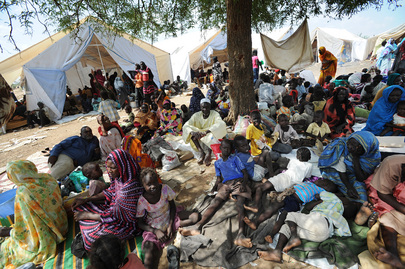
Amid calls for uniting opposition in northern Sudan with the goal of overthrowing the regime of Omar al-Bashir, one voice has begun to stick out from the usual opposition rhetoric. Daniel Kodi, governor of South Kordofan from 2007 to 2009 and SPLA commander, offers a different view on what should be done to bring peace to Sudan. He went public recently with comments that sounded conciliatory but that have also been interpreted as abetting the Khartoum government.
Kodi, a long-time SPLM member, claims that the current leadership of the Sudan People’s Liberation Movement-North, or SPLM-N, is exploiting the Nuba issue to ignite war in the country. He held a press conference in Khartoum on Sunday, August 6. Ahmed Haroun, the current governor of South Kordofan, was there among others.
Kodi blamed SPLM-N for the deterioration of the security situation in South Kordofan and accused the leadership of the SPLM-N of exploiting the people of the Nuba Mountains in order to serve the agenda of the others. “Abdul Aziz [Al-Hila] has not exhausted all opportunities to address issues peacefully,” Kodi said, claiming that the leader of the SPLM-North has based his decision to fight on unjustified reasons, dragging the Nuba people into an even larger conflict.
The Darfur rebel group Justice and Equality Movement, or JEM, and the SPLM-N recently issued a joint statement pledging their commitment to a common struggle of overthrowing the Bashir regime in Sudan. SPLM-N and JEM said that cooperation between opposition groups in the North is key, and they agreed to work with all the Sudanese political forces to re-establish democracy in the country. Malik Agar, the governor of South Kordofan’s neighboring state of Blue Nile, recently emphasized SPLM-N’s openness to work together with other groups in an interview with Enough.
The SPLM-N and two leading factions of the Sudan Liberation Movement also reportedly inked an alliance this week in Southern Kordofan, although disagreement allegedly arose already over the role of religion in the government, according to the Sudan Tribune. Disagreement within groups and infighting is arguably a leading factor that has undermined rebel movements in Sudan, a trend Khartoum has an equally long history of fomenting.
During the press conference, Kodi shared a document that calls for an immediate ceasefire, discussion on security arrangements, and an arrangement that enables popular consultation process to move forward.
Kodi said Sudanese President Omar al-Bashir should immediately adopt the ceasefire, address the humanitarian situation, and push for dialogue to solve the long-standing issues of the Nuba Mountains. He called on Abdul Aziz Al-Hila to do the same, saying that the window of opportunity for dialogue and a peaceful solution is still open. Kodi denied his dismissal from SPLM-N and affirmed he is still a member of the movement but added that the group needs to change its approach now that the South has seceded. He also said a number of SPLA leaders in South Kordofan, as well as some of the Nuba public figures, embrace his initiative and demand changes in the current SPLM-N approach to the situation.
Controversial South Kordofan governor Haroun also briefed reporters during the press conference, which, for some, muddled Kodi’s perspective. Haroun, who is wanted by the International Criminal Court for orchestrating war crimes in Darfur, stated that the National Congress Party, or NCP, has not rejected the Addis Ababa framework agreement in its entirety. He said that the NCP finds the security component of the agreement satisfactory; the party has reservations about the political component. He also said that the NCP will make security arrangements part of the platform for the dialogue with SPLM-N.
Kodi’s decision to share the stage with Haroun was a surprising move if he wanted to be seen as a peacemaker, in light of Haroun’s involvement in government-sponsored atrocities committed against the Nuba and other non-Arab tribes in the most recent violent outbreak in Southern Kordofan, which Enough and the Satellite Sentinel Project have covered extensively. Haroun’s participation in the press conference stoked concerns that the NCP had a hand in Kodi’s remarks in order to create divisions in the opposition.
But the conciliatory remarks by a leading NCP figure may indicate that Khartoum perceives SPLM-N and their allies or potential allies as a serious political force. Sudan and the ruling NCP have received significant criticism from the international community for the South Kordofan killings. Combined with the internal backlash against the NCP for “losing” the South, further escalation of violence elsewhere in the country does not work in the favor of the ruling party.
Malik Agar, the chairman of SPLM-N, and governor of the Blue Nile state told the Enough Project that it is “very unfortunate” that Kodi is going public with “unfounded allegations.” Agar said Daniel Kodi has always been a good party member and said that the SPLM-N has not discussed punitive measures regarding Kodi’s membership in the party. He said that he predicts Kodi will not be able to draw any support from the community for his initiative.
Laura Heaton contributed to this post.
Photo: Displaced people from Southern Kordofan (UNMIS)

